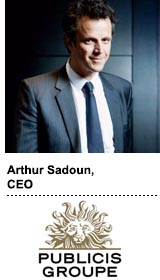
Publicis Groupe grew 0.1% to $2.5 billion in Q2, returning to positive growth after a rocky first quarter. Organic growth was down 0.7% for the first half of the year.
Despite the positive quarter, investors were skeptical of Publicis’ $4.4 billion acquisition of Epsilon, which closed in July. Many wondered why the company has such a different philosophy than its competitor Omnicom, whose CEO John Wren said just a day before that owning a data company poses long-term risk in an uncertain regulatory environment.
Publicis argued that owning Epsilon, which has a legacy of handling first-party data compliantly, will build privacy into its organization by design.
“We can’t rely on anonymous profiles in the future,” said Steve King, CEO of Publicis Media, on the earnings call. “All of our clients need to understand real people and build around IDs. Cookies are at risk and the future is about first-party data.”
Using Epsilon’s data services across its agencies could further help Publicis return to growth. And the holding company claims Epsilon will be easier to integrate than Sapient, which Publicis bought for $3.7 billion in 2014 and wrote down by half its value three years later.
“We are sharing the same culture,” Publicis Groupe CEO Arthur Sadoun said. “Those people come from marketing. They share the same clients and talent.”
Publicis hopes Epsilon’s numerous retail and financial services clients will compensate for its stagnating traditional ad business, which has slowed due to attrition and cost cutting from its FMCG clients. Traditional advertising makes up 35% of Publicis revenue, and FMCGs account for about a quarter of that percentage.
Cost cutting by just one FMCG client affected Publicis by 70 basis points in the first half of 2019, Sadoun said. Overall, pressure on the creative business reduced organic growth by 300 basis points in the quarter.
“We’re particularly exposed to fee reductions at a time our clients are facing pressure on costs,” he said. “We are shifting the revenue mix.”
Publicis hopes to grow by introducing its legacy clients to new services from Epsilon, while exposing its agencies to Epsilon clients.
“Epsilon is going to allow us to help clients suffering from disruption,” Sadoun said. “The opportunity here to uniquely grow a business from cross-selling is huge.”
With Epsilon, Publicis has all it needs to transform, Sadoun said. In 2020 the group will focus on integrating Epsilon’s core data business in the center of the organization. CJ Affiliate and Epsilon Creative Agency, which are not growing, will be subsumed into Publicis Media and Publicis Communications, respectively.
“The core of activating and enriching first-party data will be put at the center of the group to irrigate all of our operations,” Sadoun said.
Publicis expects to pay off the debt from the acquisition within four years. The Group incurred $68 million of restructuring costs in the first half of the year.
“The profound transformation we have put in place has required a lot of changes,” Sadoun said. “We have accepted the circumstances of this deep transformation in the short term as we believe it’s the best way to compete in the future.”
Overall, 24% of Publicis’ growth in Q2 came from its “strategic game changers” of data, dynamic creativity and business transformation. Publicis invested roughly $168 million into these areas and the associated talent in the last 18 months.
North America was down 1.7%, driven by cost-cutting by FMCG and CPG clients. The group will implement its “country model” in the region, where all agencies roll up to the same regional P&L, which has driven growth in the United Kingdom and France.
Epsilon, which operates a majority of its business in the United States, will also help Publicis get back to growth in the region.
“Our acquisition of Epsilon is going to increase the majority of our spend in the United States,” Sadoun said.
This post was syndicated from Ad Exchanger.


More Stories
TGF launches new brand identity for Waste Management NZ
Love Wellness Is Getting to the Root of Women’s Health
M+AD takes break for Anzac Day commemoration